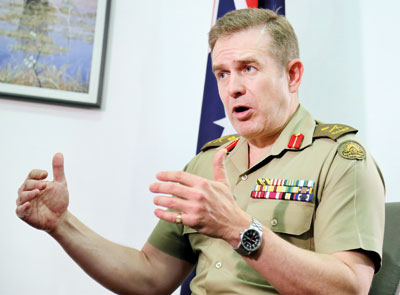News
In spite of clear ‘no no’, Lankan boat people keep coming

Andrew Bottrell in Colombo: We watch those people smugglers fairly closely. Some of them have been the same people, over time. Pic by Anuradha Bandara
The head of Australia’s border protection operation says he cannot understand why there are still Sri Lankans attempting to enter the country illegally by boat.
Since Operation Sovereign Borders (OSB) started in September 2013, Australia has turned back six boats with a total of 105 people to Sri Lanka. The last one was detected as recently as August, this year.
“I’m at pains to understand why there is this level of activity because we’ve been trying to send this message very clearly that you cannot get to Australia illegally by boat and that you will never settle in Australia if you try to come illegally, without a visa,” said Major General Andrew Bottrell, OSB Commander, in an interview with the Sunday Times.
Cooperation between Australia and Sri Lanka in this regards has been excellent, Maj. Gen. Bottrell said, during a short visit here. “But what it says is that there is still this level of activity out there that we need to combat. That’s why our policy will not change and that is why we continue to deploy more aircraft, more ships, to make sure that people smugglers will not win this issue.”
Most Sri Lankans who attempted to enter Australia in this manner were economic migrants, the Commander maintained. In nearly every case recently detected, “they have turned out to be economic migrants, people who don’t have a claim for protection”.
“The war ended quite some time ago and we are well aware that claims for protection based on what might have existed previously are no longer valid,” he said. “So, economic migrants are primarily what we are seeing and, as I said, 105 people. But we know there are others out there that people smugglers are trying to convince to get on boats.”
Some people smugglers are part of a network whose names keep coming up. “Some of them are,” Maj Gen Bottrell said, adding that he couldn’t divulge details as OSB were working with the Sri Lankan authorities. “We watch those people smugglers fairly closely. Some of them have been the same people, over time. The Sri Lankan authorities have been active and successful in undermining a lot of those activities but some of the same old names still seem to come up every once in a while.”
“I get a lot of confidence out of how successful the Sri Lankan authorities have been at disrupting a venture before people have gotten onto the water,” he continued. In August, this year, they notified OSB that there might have been a boat that got away during a specified period.
“So we then went looking for it through our Maritime Border Command,” he said, explaining that it was like searching for a needle in a haystack. “Eventually, we found a boat floating with no engine. The engine had broken down and there were six people on board. Six men who, if we hadn’t found them when we did, it is more than likely that they would have perished.”
While there were Sri Lankans currently interned in “offshore processing centres” maintained by Australia in Nauru and Papua New Guinea, the Commander said he was not aware of the numbers. It was unlikely that the information would be shared even by the authorities in Nauru and on Manus Island in Papua New Guinea due to reasons of privacy. The claims of 1,200 migrants in those camps were now being processed by US authorities under a one-off offer made by the US to grant asylum to those with genuine protection needs.
Last month, it was announced that Australia and the US have reached a settlement deal for asylum seekers detained in the two centres. Under the agreement, the most vulnerable will be relocated to the US.
“That settlement deal is obviously only available to those people who were already in Manus Island or Nauru on the date of that announcement,” Maj Gen Bottrell said. “It is not available to anyone else who tries to come after that date because it’s a one-off deal. It is up to the US to determine who they will accept. They will accept only those people who are determined to be refugees.”

